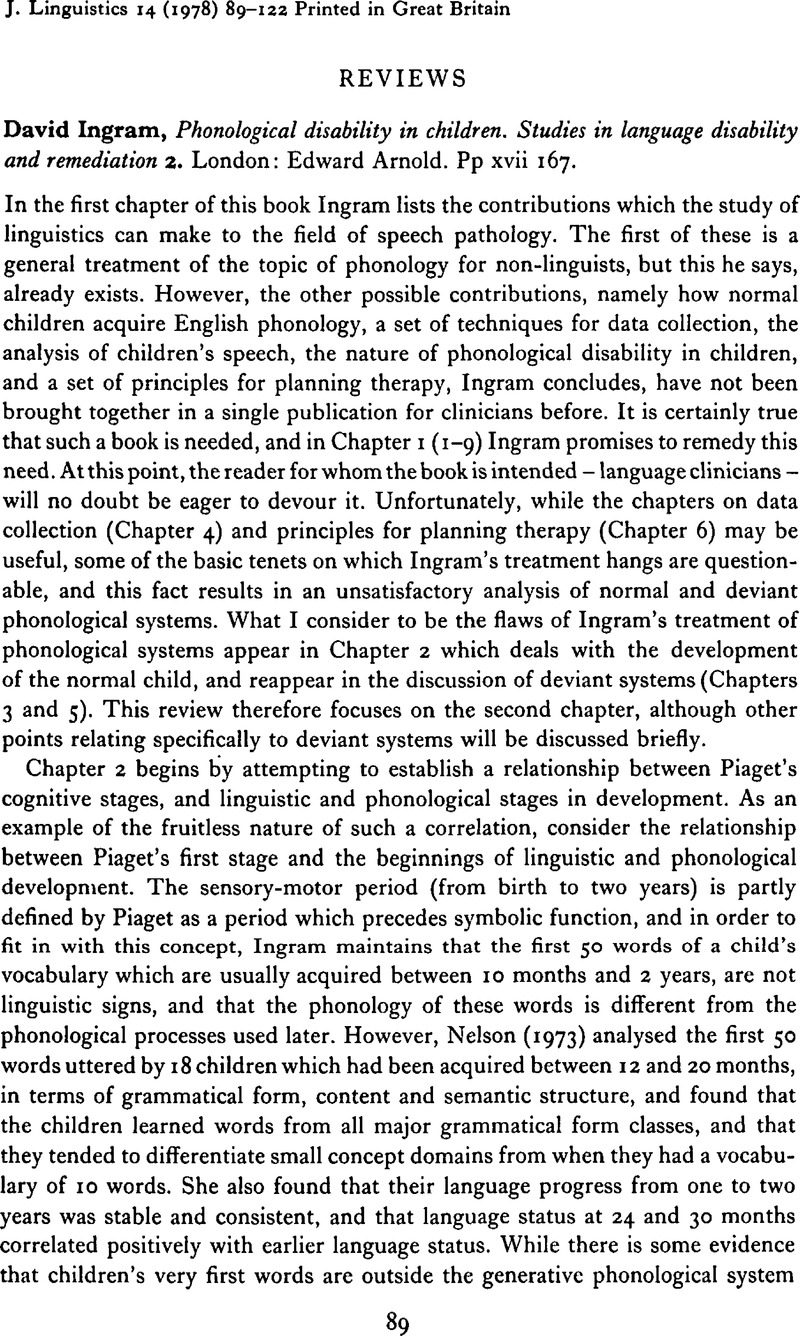No CrossRef data available.
Article contents
David Ingram, Phonological disability in children. Studies in language disability and remediation 2. London: Edward Arnold. Pp xvii 167.
Review products
David Ingram, Phonological disability in children. Studies in language disability and remediation 2. London: Edward Arnold. Pp xvii 167.
Published online by Cambridge University Press: 28 November 2008
Abstract
An abstract is not available for this content so a preview has been provided. Please use the Get access link above for information on how to access this content.

- Type
- Reviews
- Information
- Copyright
- Copyright © Cambridge University Press 1978
References
REFERENCES
Ardran, G. M., Harker, P. & Kemp, F. H. (1973). Tongue sizes in Down's syndrome. J. Mental Deficiency Research 16. 160–166.Google Scholar
Barton, D. (1976). Phonemic discrimination and the knowledge of words in children under 3 years. Papers and Reports on Child Language Development, Department of Linguistics Stanford University, Stanford, California.Google Scholar
Dodd, B. (1974). The acquisition of phonological skills in normal, severely subnormal and deaf children. (Unpub). Ph.D. Dissertation, University of London.Google Scholar
Dodd, B. (1975a). Children's understanding of their own phonological forms. Quart. J. Exp. Psychol. 27. 165–172.CrossRefGoogle ScholarPubMed
Dodd, B. (1975b). Recognition and reproduction of words by Down's syndrome and non Down's syndrome retarded children. A. J. Mental Def. 80. 306–311.Google ScholarPubMed
Dodd, B. (1976a). The phonological systems of deaf children. J. Speech and Hearing Disorders 41. 185–198.CrossRefGoogle ScholarPubMed
Dodd, B. (1976b). A comparison of the phonological systems of mental age matched normal, severely subnormal and Down's syndrome children. Brit. J. Dis. Comm. 11. 27–42.CrossRefGoogle ScholarPubMed
Jakobson, R. (1968). Child language, aphasia and phonological universals. The Hague: Mouton.CrossRefGoogle Scholar
Nelson, K. (1973). Structure and strategy in learning to talk. Monographs of the Society of Research in Child Development 38. 1–2.CrossRefGoogle Scholar
Oller, D. K. & Kelly, C. A. (1974). Phonological substitution processes of a hard of hearing child. J. Sp. H. Dis. 39. 65–74.Google ScholarPubMed
Smith, N. V. (1973). The acquisition of phonology: a case study. Cambridge: Cambridge University Press.Google Scholar
Vogel, I. (1976). Deaf phonology: a case study of an English child. Papers and Reports on Child Language Development. Department of Linguistics, Stanford University, Stanford, California.Google Scholar
West, J. & Weber, J. (1973). A phonological analysis of the spontaneous language of a four year old, hard of hearing child. J. Speech Hearing Dis. 38. 25–35.CrossRefGoogle ScholarPubMed
Zlatin, M. & Koenigsknecht, R. (1975). Development of the voicing contrast: perception of stop consonants. J. Sp. H. Res. 18. 541–553.Google ScholarPubMed


